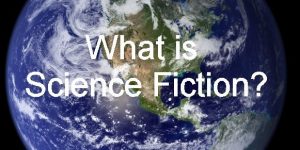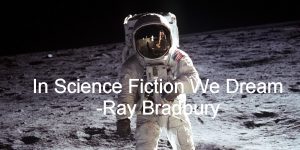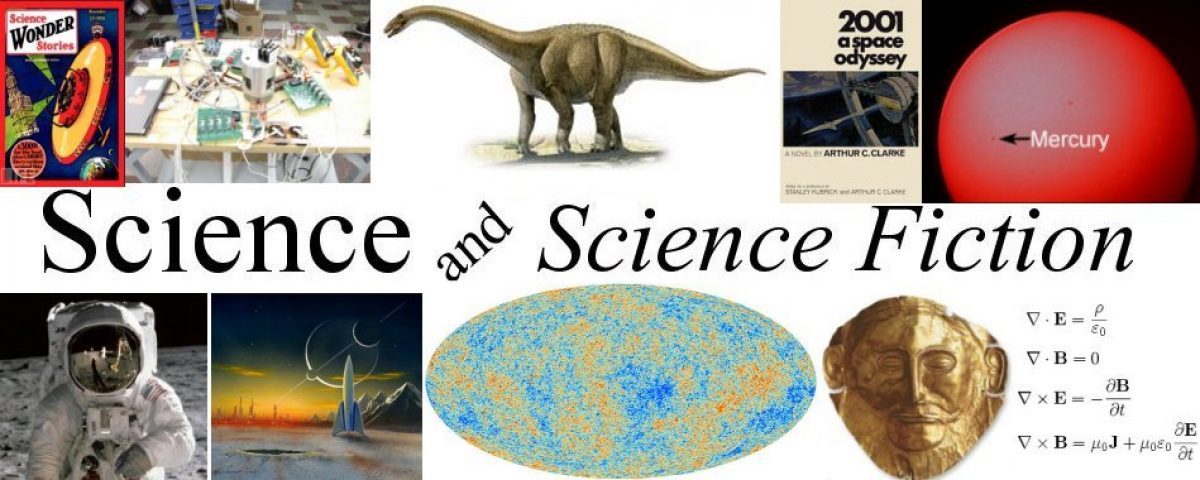What is Science Fiction, boy now there’s a tough question to answer. We all have a feeling about what makes a story Science Fiction or not. The technology is more advanced than in our present day world; lasers replace firearms, rockets replace airplanes and automobiles and etc. Also, Science Fiction stories are often set in places no human has yet visited whether it be the planets or stars or perhaps the future. Then of course there’s the alien forms of life, creatures whose nature and motives are completely unknown to us, at least in chapter one. It seems then that Science Fiction takes what we know, science is the Latin word for knowledge after all, and proceeds from there to speculate on what we don’t know.

But at the same time isn’t Science Fiction more than that, doesn’t Science Fiction allow us to ask in story form the big questions, doesn’t it enable us to think about the very nature and purpose of reality and mankind’s place in it. With Science Fiction we can look out at the Universe and then turn around and look back at ourselves.
I’m going to take a few posts over the next couple of weeks to talk about just what I think Science Fiction is. The posts may not be one after the other but hopefully I’ll keep them close together.
I’m thinking of doing this in four or five parts. Today will be just a basic introduction of Science Fiction along with a brief history. Next time I’d like to discuss what I’ll call the great themes of Science Fiction, which will be followed by an analysis of some of the most famous Science Fiction novels and stories using those themes. In the final part I’ll talk about the difference between Science Fiction and Fantasy as I see it.
Now right up front I admit that this is going to be pretty much just my opinion. Oh, I’ll do my best to get the authors’ names and the titles correct, but really I don’t expect anyone to agree with me completely. Indeed, feel free to dispute everything I say.
If I just prompt you to think a little about Science Fiction. Or if you are inspired to find and read one of the novels I mention for the first time, then I will have done my job.

As a literary form Science Fiction has a much older history than you might think. What is generally regarded as the first Science Fiction romance was “True History” by the second century CE poet Lucian of Samosata. (By the way the term romance simply means a story composed in the Roman fashion, today we would call it a novel or novella)
The idea of writing a story that you don’t want anyone to believe was so unusual at that time that Lucian felt the need to tell his readers at the end that the things in his tales “do not in fact exist and could not ever exist at all”.
The story in “True History” concerns a group of travelers who are swept up to the Moon on a whirlwind where they witness a war between the armies of the Moon and the Sun over which would colonize the morning star. The story therefore contains two of the elements we mentioned earlier. Travel to a place no one had ever traveled to before and while there encountering strange and alien creatures.
Over the next 1500 years or so a rare story would be written that today we would call science fiction. Cyrano de Bergerac (yes he really lived, big nose and everything) wrote another story about a trip to the Moon but he used a balloon and, get this, rockets.
It wasn’t until the late 19th century however that we get authors who wrote several Science Fiction stories thereby establishing Science Fiction as a genre. I’m speaking of course about Jules Verne and H. G. Wells and this is where I’m going to stop for today. Next time I’m going to use the novels of these two pioneers in Science Fiction to discuss what I call the ‘Great Themes of Science Fiction.” Till then.
